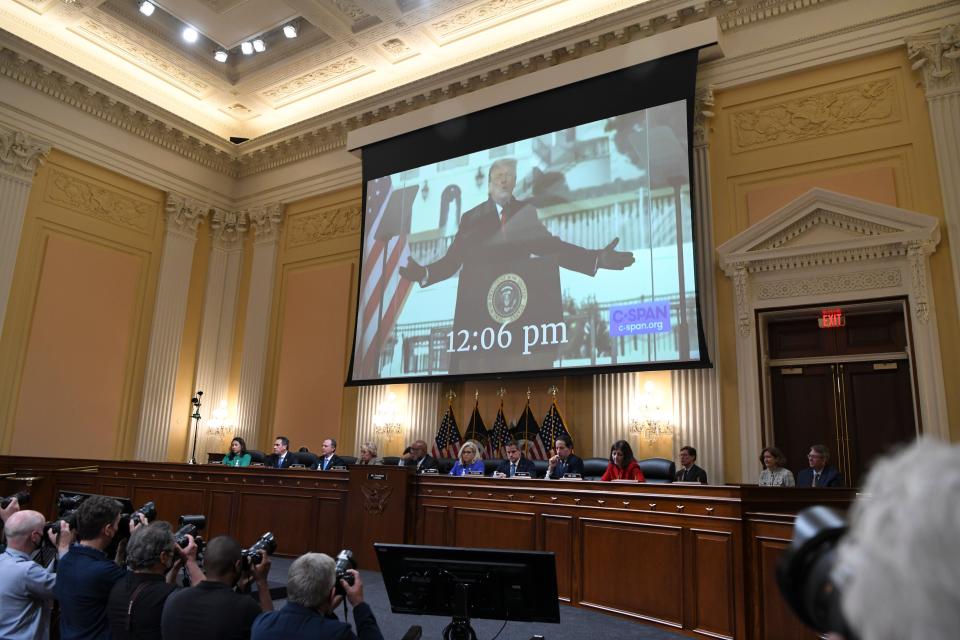Will Donald Trump put to shame Charles Ponzi and Bernie Madoff?
- Oops!Something went wrong.Please try again later.
The select committee investigating the Jan. 6 insurrection is making a fraud case against Donald Trump.
The evidence is strong, but will the cultists who support the former president believe it, no matter the proof?
No.
The committee has shown how Trump solicited roughly $250 million from gullible supporters, saying the money was meant to be used for a so-called “Official Election Defense Fund” that, essentially, did not exist.
As Rep. Zoe Lofgren put it during Monday’s public hearing, “Throughout the committee’s investigation, we found evidence that the Trump campaign and its surrogates misled voters as to where their funds would go and what they would be used for. So not only was there the big lie; there was the big rip-off.”
The evidence is there.
'False election claims to fundraise'

Instead of election challenges, the select committee pointed out that the money solicited by Trump went to “a conservative organization employing former Trump staffers, to the Trump Hotel Collection, to the company that organized the rally that preceded the attack on the Capitol last Jan. 6” and others.
Amanda Wick, a lawyer for the Jan. 6 committee, said, “The evidence developed by the select committee highlights how the Trump campaign aggressively pushed false election claims to fundraise, telling supporters it would be used to fight voter fraud that did not exist. The emails continued through Jan. 6, even as Trump spoke on the Ellipse. Thirty minutes after the last fundraising email was sent, the Capitol was breached.”
The cultists do not care.
They refuse to believe.
They refuse even to hear the evidence, perhaps out of fear that they might believe, and they do not want to risk that. It’s a mindset that is difficult to imagine.
Maybe the best way to understand the zealots who continue to support Donald Trump is to consider for a moment the most infamous of all con men – Charles Ponzi.
How the conned remain believers
In the early part of the 20th century Ponzi came up with the scheme subsequently named after him in which he promised investors returns of 50% in 45 days, or 100% in 90 days. Then he paid these investors using money from other investors, while accumulating a fortune for himself.
In our lifetime, this scheme was taken to a whole new level by Bernie Madoff.
Ponzi eventually was exposed, charged with crimes and sent to prison.
The extent of the power such individuals have over those they con, however, might be evidenced by the fact that some of the people Ponzi scammed continued to ask him to invest their money after he was behind bars.
There have always been such people.
Victor Lustig convinced his marks that the Eiffel Tower was to be dismantled and took bids from scrap dealers over who would get the job.
George C. Parker convinced wide-eyed suckers that they could purchase a piece of the Brooklyn Bridge and then set up their own toll booths.
Ponzi and Madoff paid. Will Trump?
Madoff’s fraud is estimated to have raked in nearly $65 billion. Investors who had suspicions turned a blind eye for years and years. Many never admitted that they’d been scammed. Some, no doubt, still believed in him.
Now, there’s Trump, who not only has convinced millions that the election was stolen – though there is zero proof that such a thing happened and tons of proof that it did not – and has simultaneously convinced many of those same conned believers into sending him millions of dollars.
Federal law defines fraud (for which a guilty party can receive up to 20 years in prison) as “having devised or intending to devise any scheme or artifice to defraud, or for obtaining money or property by means of false or fraudulent pretenses, representations, or promises … .”
The Justice Department will make the call when it comes to Donald Trump.
Ponzi was made to pay for his crimes.
Madoff died in prison.
Trump wants to be president. Again.
Reach Montini at ed.montini@arizonarepublic.com.
For more opinions content, please subscribe.
This article originally appeared on Arizona Republic: Will Donald Trump outdo Charles Ponzi and Bernie Madoff?

